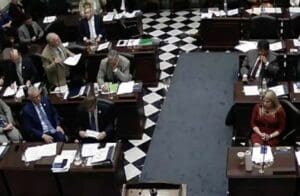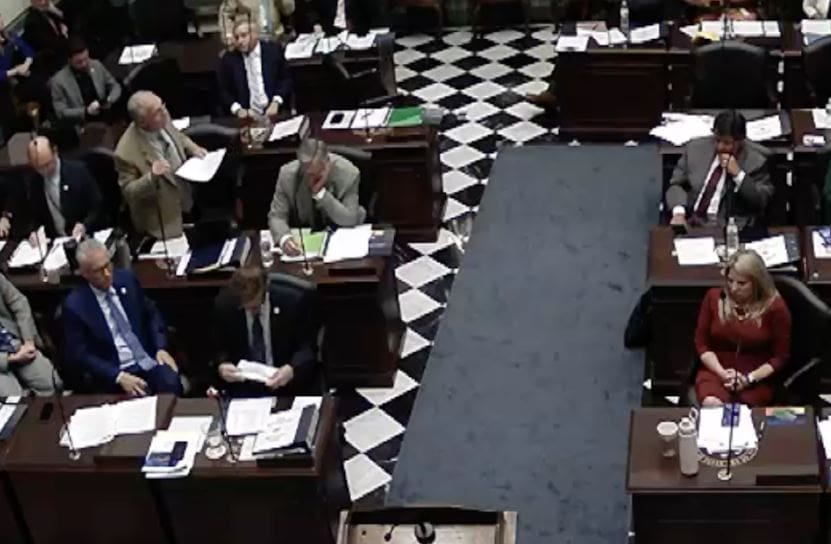

The House passed a climate bill on Tuesday, despite Republican opposition.
Rep. Rich Collins on Tuesday begged House Democrats to join him in opposing a bill that set greenhouse gas emission limits in Delaware.
“I have begged you to stand up one time and not just take this direction that apparently is so overwhelmingly powerful in this chamber,” the Millsboro Republican said. “And I know I’ve lost. I tell you it’s more than a loss on the bills, folks. This is a lifetime goal. And I’ve lost. And if that gives you satisfaction, more power to you.”
Democrats not only ignored him, but two of his fellow Republicans – Mike Smith, R-Pike Creek, and Kevin Hensely, R-Middletown – joined Democrats in passing the bill 27 to 13.
House Bill 99, sponsored by Rep. Deb Heffernan, D-Bellefonte, would require net greenhouse gas emissions in Delaware to be 50% of the 2005 levels by 2030 and have net zero emissions by 2050.
There were two amendments to the bill, one by Heffernan and the other by Collins.
Heffernan’s amendment, which passed unanimously by voice vote, would:
- Have the state consider labor and energy costs in reaching the climate goal.
- Requires DNREC to adopt rules at least 18 months before the effective days of new regulations on emission reductions.
- Changes the name of the Scientific Committee on Climate Scenarios to technical climate advisors.
- Requires the names of the technical climate advisors to be posted publicly.
- Sends the climate action plan to more people than are now scheduled to get it.
- Forces the climate action plan to also include ways to offset emissions.
Rep. Ruth Briggs King, R-Georgetown, said the term technical climate officers is vague.
Heffernan said in response that the technical advisors won’t have any authority, but will only be used as expert opinions for how the state could meet the bill’s climate goal.
Collins’ amendment, which failed 25 to 15, would have removed several lines from the bill that allow agencies in the state to act upon the recommendations by DNREC to reduce greenhouse gas emissions.
Collins also complained that Democrats were talking over him. Speaker of the House Pete Schwartzkopf called Collins out of order, and Collins apologized.
Related Story: First of 7 climate change bills moves to House floor
Heffernan said the bill itself doesn’t do anything by itself, but gets the state to reach net zero emissions through whatever methods necessary work for Delaware.
“It does not ban gas cars. It does not ban natural gas,” Heffernan said. “In fact, it does not require any concrete strategies. HB 99 in its simplest form, sets greenhouse gas emission reduction goals for the state of Delaware and creates a robust planning process to help our state meet those goals.”
House Minority Whip Lyndon Yearick, R-Camden, asked DNREC Secretary Shawn Garvin what will happen if the state isn’t on track.
Garvin said in response that every few years DNREC will be giving the state updates and evaluating how much progress the state is making, but that there aren’t any consequences for the state not meeting the emission reduction goals.
Collins asked Garvin what they’re doing to make sure the electrical grid will still be functional, to which Garvin said they are working with PJM and others to make sure the grid is still operating.
Briggs-King asked how they will balance costs and serving underserved communities, and Garvin said he would appreciate any recommendations from legislators on how they can make the climate plan be implemented in an equitable way.
A previous version of the bill from last year, sponsored by Sen. Stephanie Hansen, D-Middletown, had specified reducing gross emissions, meaning no greenhouse gas emissions could come out of Delaware.
That bill passed the Senate 13 to 6 but didn’t get a vote in a House committee.
Because House Bill 99 states net emissions, pollutants can come out of Delaware, but they have to be offset by other practices, such as planting more trees, that remove carbon from the atmosphere.
The bill, which doesn’t require a fiscal note, has 32 additional sponsors and cosponsors, all Democrats, and must now make its way through the Senate.
Share this Post



